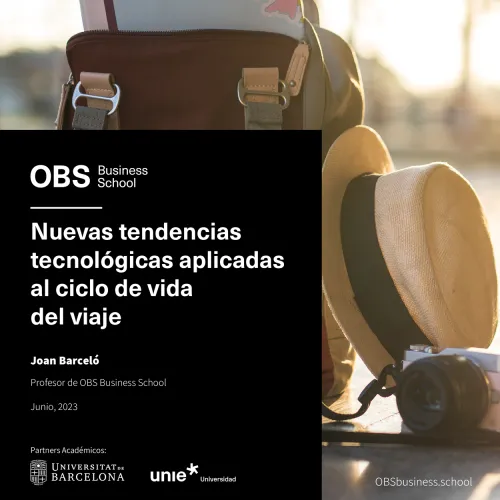
OBS Report: New technology trends applied to the travel lifecycle
Today's travellers visit 35 different websites before booking their trip
- Around 98% of travellers search for online information before they book a trip. Platforms such as Instagram (44%), Facebook (33%) and TikTok (22%) have become essential sources of inspiration.
- The challenge for businesses in the travel industry is to be able to create quality virtual inspirational experiences. 46% of travellers say they are willing to experience virtually before they travel.
- Quantum computing and Generative Artificial Intelligence will advance the industry exponentially, but not without its risks and ethical debate.
- Flexibility and sustainability are top priorities for today's traveller.
OBS Business School has published the report New technological trends applied to the travel lifecycle, directed by Joan Bareceló, academic director of the school's Global MBA. The report analyses the different phases that make up a trip (inspiration, planning, booking, experience and memory) and their evolution due to technologies, both from the perspective of the traveller and their new needs, as well as from the perspective of the companies in the sector.
In 2019, tourism accounted for 10.3% of global GDP and generated one in ten jobs. In the last 10 years, Spain has been one of the three most visited countries in the world; in 2022 it welcomed more than 71 million international tourists with an expenditure of 87,061 million euros. Therefore, it is clear that the desire to travel has not diminished, although travellers increasingly require more personalisation, flexibility and knowledge of what their experience will be like on the trip they are going to make. They like to enjoy the different phases, from the moment they start to think about where to go until after their return, when memories are generated, which is why companies in the sector must be able to identify those aspects that will make the tourist's planning and enjoyment of their trip more comfortable, complete and satisfactory.
The tourists of thirty years ago are nothing like those of today; the emergence of technology has made today's travellers more demanding, and the sector has become a jungle where companies compete to capture the attention of users. Thus, 98% of travellers get information online before buying, and platforms such as Instagram (44%), Facebook (33%) and TikTok (22%) have become sources of inspiration when it comes to travelling, mainly for holidaymakers and especially when they belong to Generation Z. Emerging technologies such as virtual reality, augmented reality or the metaverse can also be very relevant as a source of inspiration, as they allow us to experience sensations before deciding where we want to travel. Forty-six percent of travellers say they are willing to experiment virtually before they travel; in this field, the airline KLM is a pioneer, already using augmented reality to check baggage size and virtual reality to train its employees.
The challenge for companies in the sector in the near future, therefore, is to be able to create quality virtual inspirational experiences. To this end, technologies such as quantum computing and Generative Artificial Intelligence will be key. The OBS report foresees exponential advances in these fields, but also stresses that this expansion will not be without risk and ethical debate, and legal regulation will have to be created. Joan Barceló says: "If you combine Generative Artificial Intelligence with customer product data and preferences, real-time connectivity, with specific platforms in the tourism industry that provide quotes and availability of accommodation services, transfers, activities, etc., you have a powerful accelerator of planning for both travellers and the agents that support this process". Another technology that may help the tourism sector in the future is quantum computing, although the first practical applications are not expected for a few years.
This is the traveller of today
Flexible conditions such as early cancellation (required by 78% of travellers), different forms of payment and travel insurance (55%) are preferences when preparing for travel, as well as having up-to-date information on health restrictions or health and safety issues at the destination. On average, today's travellers visit thirty-five different websites before booking their trip and up to 93% say they prefer retailers that make it easy for them to search and offer help in sifting through the available options, even if it means paying a little more. Seventy-seven percent of travellers have interacted with a chatbot, but when faced with any kind of problem, three out of four prefer to be dealt with by a person via phone or chat.
Today's travellers also expect to be rewarded for their loyalty and in this context the potential of NFTs is worth highlighting, although to date they are not being consolidated due to a lack of agreement between all participants in the value chain. In the last year there have been one-off initiatives such as that of Air Europa, which in April 2022 announced its first limited series of NFT airline tickets, called NFT Tickets, which included other services associated with art-related events. This shows that the use of NFTs is technically feasible in loyalty programmes, offering unique digital objects, and also as a new distribution channel, although there is still no coordinated momentum among all the actors that should be involved.
As for payment methods, they continue to evolve, but the OBS report estimates that a period of adaptation will be needed to build trust in payment methods based on biometrics, cryptocurrencies or subscription models.
Sustainability in the tourism sector
Today's traveller is increasingly concerned about sustainability. 84% of travellers aged 18-41 are willing to pay more for environmentally friendly travel options, although this percentage drops to 55% for travellers aged 42+. Nowadays, it is already possible to obtain information on estimated CO2 emissions on numerous flight search platforms, such as Kayak.es or Google Flights, and accommodations have the possibility to provide information on their sustainability practices and certifications issued by independent organisations, such as the Bioscore platform, which provides a certification that allows to evaluate the hotel's sustainability index and display this information on sales channels such as Destinia. The Iberostar Group's Wave of Change initiative is also a clear example of a pioneering responsible tourism project.
In addition, some companies also offer the possibility of offsetting their carbon footprint through reforestation programmes, such as World 2 Meet's Icarion Grand Voyages operator, which also provides all travel documentation in fully digital format on its APP. Some distribution networks, such as Viajes Azul Marino, have opted for the use of renewable energy and implemented energy efficiency plans.
Content written by:
Carmen García-Trevijano
OBS Business School Press Office

